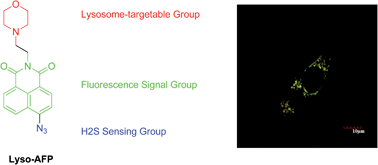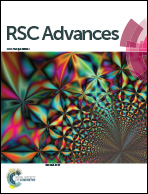A turn-on fluorescent probe for imaging lysosomal hydrogen sulfide in living cells†
Abstract
Hydrogen sulfide (H2S) is an endothelial gasotransmitter which has been extensively studied recently in various physiological processes. H2S can induce lysosomal membrane destabilization leading to an autophagic event of precipitation apoptosis coupled with calpain activation, thus ensuring cellular demise. In this study, we developed a lysosome-targetable fluorescent probe for the recognition of H2S with considerable fluorescence enhancement. Through introducing a lysosome-targetable group 4-(2-aminoethyl)-morpholine into the H2S probe N-imide termus of 4-azide-1,8-naphthalimide, the new compound Lyso-AFP can recognize H2S in lysosomes. This probe emerges as a more biocompatible analysis tool with low poison by-product than reported H2S fluorescent probes.


 Please wait while we load your content...
Please wait while we load your content...